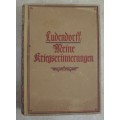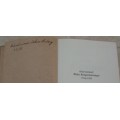Book - My War Memories - Gen. Erich Ludendorff - WW1 Germany 1919 - 1st ed
Check my rate
| Main centres: | 1-3 business days |
| Regional areas: | 3-4 business days |
| Remote areas: | 3-5 business days |
Product details
This is a genuine first edition German book from General Erich Ludendorff still in original binding and cover box, including 10 brand new and unused maps as well as newspaper clips from 1919. the book is in excellent condition inside as well only some water stains outside, and only one inscription. Only 2 other copies detected , one has been re-bound. an extremely rare antique and collectable book in great condition.
Autobiography
It was not until two Russian armies threatened to overrun the German 8th Army in East Prussia that Ludendorff was appointed chief of staff of the 8th Army. Ludendorff was assigned to the elderly General Paul von Hindenburg, who was renowned for his iron nerves. In 1917 he approved the unrestricted submarine warfare against the British that led to the entry of the United States into the war against Germany but not to Englands collapse. After the tsar had been deposed in March 1917, Ludendorff gave his blessing to the return of the Russian Bolshevik emigrants (including the as yet unknown V.I. Lenin), in the hope of persuading the Russians to conclude peace.
Hindenburg and Ludendorff, who now exercised a sort of military semi-dictatorship, also brought about the dismissal of Chancellor Theobald von Bethmann Hollweg in the delusory hope that a strong man could be found to assume the leadership of the Reich. On March 21, 1918, Ludendorff opened a general offensive on the Western Front with the object of smashing the Anglo-French armies and forcing a decision in Europe before the Americans arrived in force. But he had overestimated the strength of the German armies; the offensive failed, and when, in the autumn of 1918, the collapse of the German alliesAustria-Hungary, Bulgaria, and Turkeywas imminent, Ludendorff demanded immediate negotiations for an armistice. For a while, the nerves of the hopelessly overworked general gave way, and a psychiatrist had to be summoned to supreme headquarters.
When Ludendorff realized the severity of the armistice conditions, he insisted that the war be carried on. When he saw that the political leaders were not prepared to do this, he offered his resignation, which William II accepted on Oct. 26, 1918. At the same time, the emperor, much to Ludendorffs distaste, ordered Hindenburg to remain at his post. A titan of willpower and energy who had attempted the impossible was suddenly torn away from his sphere of activity; the shock was immense. Ludendorff met the revolution that broke out in November 1918 with complete resignation and went into exile in Sweden for several months. Ludendorff, however, whose ambition was as immense as his strategic gifts, at the close of the lost war claimed to have been the sole real commander of World War I.
During the next 20 years Ludendorff led a bizarre life. Adopting the role of the betrayed and misunderstood commander, he took part in the unsuccessful coups détat of Wolfgang Kapp in 1920 and of Adolf Hitler in 1923, and in 1925 he ran for president against his former commander in chief, Hindenburg, whom he now bitterly hated. From 1924 to 1928 he was a National Socialist member of Parliament. Consistently pursuing a purely military line of thought, Ludendorff developed, after the war, the theory of total war, which he published as Der Totale Krieg (The Nation at War) in 1935. In the first half of the 19th century, the great military theorist of the Prussian general staff, Carl von Clausewitz, had advanced the doctrine of war as an extension of politics by different means.



